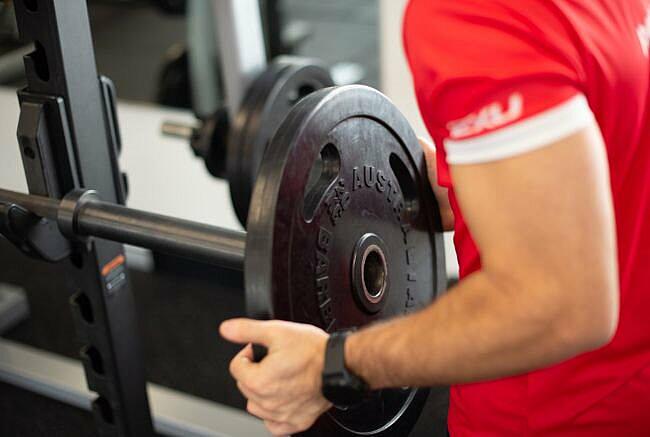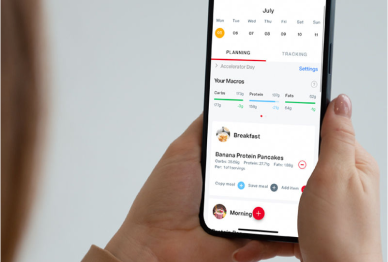Summary
Can you gain muscle in a calorie deficit?: The question of whether muscle growth can occur in a calorie deficit has long intrigued fitness enthusiasts. Yes, it’s possible with the right balance of nutrition, strength training, and recovery.
Why gaining muscle in a calorie deficit matters: Gaining muscle while losing fat offers a healthier, leaner physique, enhances metabolic health, and boosts physical performance—all while maintaining a caloric deficit for fat loss.
Vision Personal Training’s role in muscle gain during a calorie deficit: Vision Personal Training supports clients in achieving muscle gain in a calorie deficit through personalized nutrition plans, MyVision recipes, strength training guidance, and community accountability to ensure success.
How to gain muscle in a calorie deficit: By incorporating a moderate calorie deficit, prioritising protein, and focusing on compound strength training exercises, you can gain muscle while shedding fat.
Long-term benefits of muscle gain in a calorie deficit: Combining muscle gain with fat loss leads to body recomposition, increased strength, a healthier metabolism, and sustainable fitness habits that promote long-term success.
Topics Covered:
- Can You Gain Muscle in a Calorie Deficit?
- Why Gaining Muscle in a Calorie Deficit is Important
- The Role of Protein in Preserving Muscle
- How Vision Personal Training Supports Muscle Gain in a Calorie Deficit
- Strength Training for Muscle Gain in a Deficit
- Long-Term Benefits of Combining Fat Loss and Muscle Gain
- Conclusion: Achieve Body Recomposition Through Muscle Gain in a Deficit
Can You Gain Muscle in a Calorie Deficit
This question has puzzled fitness enthusiasts and professionals alike. The common belief is that muscle gain requires a caloric surplus. But is this always the case?
In this article, we'll delve into the science behind muscle growth and calorie intake. We'll debunk myths and provide you with practical strategies for achieving your fitness goals.
Whether you're a life coach, a personal trainer, or someone on a personal fitness journey, this guide is for you. Let’s explore the possibility of gaining muscle in a calorie deficit and how you can make it work for you.
Understanding Calorie Deficit and Muscle Growth
First, let’s define what a calorie deficit is. A calorie deficit occurs when you consume fewer calories than your body needs to maintain its current weight. This deficit forces your body to use stored fat for energy, leading to weight loss. But what about muscle growth?
Muscle growth, or hypertrophy, occurs when muscle fibres repair and grow thicker after being damaged during exercise. This process requires energy, which we get from calories. So, how can you gain muscle in a calorie deficit?
Here’s how:
- Maintain a moderate calorie deficit: Extreme deficits can lead to muscle loss.
- Prioritise protein: It’s crucial for muscle repair and growth.
- Incorporate strength training: It stimulates muscle growth and helps preserve muscle mass.
The Role of Protein in Muscle Preservation
Protein plays a vital role in muscle preservation and growth. It provides the amino acids that your body uses to repair and build muscle fibers.
When you're in a calorie deficit, your body can use these amino acids for energy. This can lead to muscle loss if not managed properly. To prevent this, it's important to consume enough protein. This helps ensure that your body has the amino acids it needs to repair and grow your muscles, even in a calorie deficit.
Calculating Your Caloric Needs for Muscle Gain
To gain muscle in a calorie deficit, you need to know your daily caloric needs. First, calculate your Total Daily Energy Expenditure (TDEE). This is the total number of calories you burn in a day, including those burned during exercise.
Next, subtract a small number of calories to create a moderate deficit. This should be enough to promote fat loss, but not so much that it hinders muscle growth.
Remember, everyone’s caloric needs are different. Factors like age, sex, weight, and activity level can all affect your TDEE and the size of the deficit you should aim for.
Strength Training: The Key to Muscle Gain in a Deficit
Strength training is essential for gaining muscle in a calorie deficit because it promotes muscle hypertrophy by causing damage to muscle fibers, which then triggers a repair process that makes muscles grow stronger and thicker. Stronger by Science highlights that muscle gain is still possible in a deficit if you follow a structured strength training regimen, especially if your calorie deficit is moderate (around 10-20%) and protein intake is high. In such conditions, your body can use stored fat for energy, allowing the protein you consume to focus on muscle repair and growth
Progressive overload, a technique involving gradually increasing the weight or intensity of your workouts, is vital to stimulate continuous muscle growth during strength training. Research from Sci-Fit emphasises that individuals, especially beginners and those with higher body fat, can gain muscle while losing fat in a deficit by maintaining sufficient protein intake and ensuring consistency in strength training.
They also found that regular training sessions, three to four times a week, are crucial to keep muscle stimulation ongoing.
However, for more experienced lifters or athletes with low body fat percentages, gaining muscle in a calorie deficit is more challenging due to their proximity to their genetic potential. Frontiers in Physiology supports this notion, suggesting that advanced athletes may need a caloric surplus to optimize muscle hypertrophy, while beginners can still make progress even in a deficit.
The Importance of Moderate Deficit and Recovery
A moderate calorie deficit is important for muscle gain. Too large a deficit can lead to muscle loss, as your body may start breaking down muscle for energy. A moderate deficit, on the other hand, allows for fat loss while preserving muscle mass.
Recovery is also crucial. This is when your body repairs and grows your muscles. Ensure you're getting enough sleep and taking rest days between intense workouts to support this process.
Recompositing: Fat Loss Meets Muscle Gain
Body recompositing refers to the process of losing fat and gaining muscle simultaneously. It’s a balance that can be achieved, even in a calorie deficit.
The key is to consume enough protein to support muscle growth while maintaining a calorie deficit to stimulate fat loss.
Strength training is also crucial in this process. It stimulates muscle growth and increases your metabolic rate, helping you burn more calories even at rest.
Remember, body recompositing is a slow process. It requires patience, consistency, and a well-balanced approach to diet and exercise.
Hormones and Their Impact on Muscle Gain
Hormones play a significant role in muscle gain. Testosterone, for instance, is crucial for muscle growth. In a calorie deficit, your testosterone levels can decrease. However, regular strength training can help maintain your testosterone levels, supporting muscle growth.
Growth hormone, another important hormone for muscle growth, is released during sleep. This highlights the importance of good sleep hygiene for muscle gain in a calorie deficit.
Practical Strategies for Muscle Gain in a Calorie Deficit
Achieving muscle gain in a calorie deficit is not just about cutting calories and hitting the gym. It requires a strategic approach.
- Prioritize protein: Aim for a daily intake of 1.6 to 2.2 grams of protein per kilogram of body weight. This supports muscle growth and helps keep you satiated.
- Incorporate strength training: Focus on compound movements like squats, lat pull downs, and bench presses. These exercises engage multiple muscle groups, promoting overall muscle growth.
- Ensure adequate recovery and sleep: Muscles repair and grow during rest.
Here are some practical strategies:
- Prioritise protein in your diet
- Incorporate strength training into your routine
- Ensure adequate recovery and sleep
Managing Hunger and Cravings While Dieting
Dieting doesn’t have to mean constant hunger and cravings. There are strategies to manage these challenges.
Firstly, focus on whole, nutrient-dense foods. These foods are high in fibre and protein, which can help keep you feeling full.
Secondly, stay hydrated. Sometimes, our bodies can mistake thirst for hunger. Regularly drinking water can help keep hunger at bay.
Lastly, allow yourself some flexibility. It’s okay to have a treat now and then. This can make your diet more sustainable in the long run.
Setting Realistic Goals and Tracking Progress
Setting realistic goals is crucial when aiming for muscle gain in a calorie deficit. This process takes time, and there are no quick fixes—consistent effort is what yields results. To help you stay on track, Vision Personal Training provides the MyVision app, a valuable tool for monitoring progress beyond just the number on the scale. The app allows you to track essential indicators like weight loss, body measurements, and your overall fitness score which provide a clearer picture of your overall progress.
In addition, Vision Personal Trainers offer personalised guidance to ensure you're progressing toward your goals. They help you set achievable milestones and provide accountability throughout your journey, ensuring that you are not only dropping the fat but also gaining muscle efficiently. By combining the MyVision app with support from a Vision Personal Trainer, you can better visualise and track your fitness improvements over time, ensuring you stay motivated and on course.
The Role of Community and Support Systems
Having a supportive community can make a big difference in your journey. Whether it’s a workout buddy, an online group, or a personal trainer, having others to share the journey with can be motivating.
Remember, everyone’s journey is unique. Comparisons can be unhelpful. Focus on your own progress and celebrate your victories, no matter how small.
Conclusion: Patience and Consistency Wins
If you’re struggling to get a handle on your nutrition or unsure how to balance muscle gain and fat loss, you're not alone. At Vision Personal Training, we're here to help—not just with your training and fitness, but also with understanding and optimising your nutrition. We offer personalised guidance tailored to your needs, ensuring that you’re equipped with the knowledge and tools to succeed.
Vision Personal Training is proud to be Australia's largest personal training network, and we’re dedicated to supporting you every step of the way. Our expert trainers do more than just workouts. They also teach you about nutrition. This education is tailored to your goals and lifestyle.
Get in contact with us today, and start your journey toward a healthier, stronger you!
References
- Stronger by Science: Building Muscle in a Caloric Deficit
- Sci-Fit: Can You Build Muscle in a Calorie Deficit?
- Frontiers in Physiology: Energy Surplus and Muscle Hypertrophy


